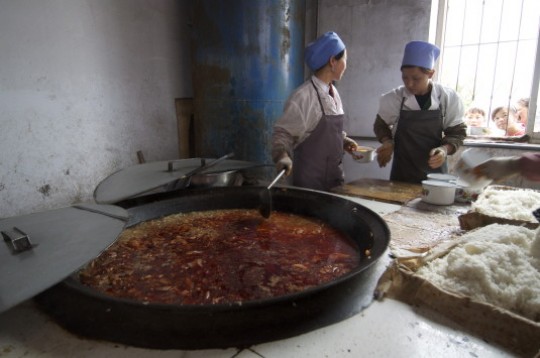Stanford research on nutrition influences policy change in China
Stanford research on nutrition influences policy change in China
As markets around the world slump, sputter and slump again, China maintains the fastest-growing economy. But despite the country’s boom, it has fallen behind in making sure its children will be healthy, strong and smart enough to cash in on it.
About 30 percent of children living in China’s rural areas are anemic – sick with an iron deficiency that Stanford researcher Scott Rozelle and his colleagues with the Rural Education Action Project have proven leads to bad school performance. And a poor education coupled with anemia’s physical blow puts those kids at risk for lives of poverty and missed opportunities.
But things are changing. Influenced in part by the research Rozelle has conducted and presented to Chinese officials, the government recently launched a policy to improve school lunches for about 20 million children across the country.
The plan invests $2.5 billion a year during the next nine years to ensure the meals are more nutritious for elementary and middle school students. That doubles the amount spent on lunches for China’s neediest children.
“For 5,000 years it was OK to be anemic if you’re never going to leave the farm,” said Rozelle, an economist and senior fellow at Stanford’s Freeman Spogli Institute for International Studies who is still experimenting with ways to improve children’s health in rural China and get the government to adopt the most effective methods.
“But we’re looking 20 years into the future where there are much fewer farms and you need at least a high school education to make a living in the city,” Rozelle said. “If you are sick with anemia, it is going to affect your cognitive ability, educational performance and ultimately your chances of going on in school.”
Rozelle began studying anemia and its links to school performance in 2008.
After conducting an initial study of about 4,000 primary school students in Shaanxi province, he found that nearly 40 percent of the children were anemic – the result of diets that consisted mostly of rice and noodles in regions where meat, fruit and fresh vegetables are expensive and often hard to come by.
Those survey results were presented to the government in a 2009 policy brief written by Rozelle and his collaborators. Officials adopted the brief, making rural primary school nutrition part of China’s official policy discussion.
A second study conducted between 2008 and 2009 found that anemia rates dropped when schoolchildren were given vitamins fortified with iron. And as their iron levels rose, so did their test scores.
An experiment followed to back up those findings, while another set of large-scale surveys across four provinces reinforced that childhood anemia was indeed a widespread problem.
The findings from those surveys and tests were packaged in another policy brief that was accepted by the government earlier this year, prompting a government directive urging more concrete action in the area of student nutrition.
Those documents, along with several presentations Rozelle has made to government officials and commissions, have culminated in a move to pour $22.5 billion into more nutritious school lunches between now and 2020. It will likely be up to local government and school officials to decide exactly what those meals will include, but Rozelle is hopeful they’ll lead to diets with more meat, vegetables and iron supplements.
“Research-based results are an important avenue for affecting policy in China,” said Chen Zhili, vice chair of the Standing Committee of the National People’s Congress and a former minister of education. “The new programs for child nutrition were only made possible by the work of groups (like the Rural Education Action Project).”
And a national policy aimed at improving nutrition and curbing anemia helps ensure that China maintains its foothold in the world’s economy and grow in a more stable, equitable way, Rozelle said.
“The social return is huge,” Rozelle said. “These kids will be able to do better in school, work harder and sustain China’s growth.”
By Adam Gorlick
November 21, 2011 – FSI Stanford, FSE, REAP News
###

Scott Rozelle, PhD
Helen F. Farnsworth Senior Fellow, FSI; Affiliated Faculty, CDDRL; and Co-director, REAP
Shorenstein APARC
Stanford University
Encina Hall East, E407
Stanford, CA 94305-605
Scott Rozelle is the Helen F. Farnsworth Senior Fellow and the co-director of the Rural Education Action Program in the Freeman Spogli Institute for International Studies at Stanford University. He received his BS from the University of California, Berkeley, and his MS and PhD from Cornell University. Previously, Rozelle was a professor at the University of California, Davis and an assistant professor in Stanford’s Food Research Institute and department of economics. He currently is a member of several organizations, including the American Economics Association, the International Association for Agricultural Economists, and the Association for Asian Studies. Rozelle also serves on the editorial boards ofEconomic Development and Cultural Change, Agricultural Economics, the Australian Journal of Agricultural and Resource Economics, and the China Economic Review.
His research focuses almost exclusively on China and is concerned with: agricultural policy, including the supply, demand, and trade in agricultural projects; the emergence and evolution of markets and other economic institutions in the transition process and their implications for equity and efficiency; and the economics of poverty and inequality, with an emphasis on rural education, health and nutrition.
Rozelle’s papers have been published in top academic journals, including Science, Nature,American Economic Review, and the Journal of Economic Literature. He is fluent in Chinese and has established a research program in which he has close working ties with several Chinese collaborators and policymakers. He is the chair of the International Advisory Board of the Center for Chinese Agricultural Policy; a co-director of the University of California’s Agricultural Issues Center; and a member of Stanford’s Walter H. Shorenstein Asia-Pacific Research Center and Food, Security, and the Environment Program.
In recognition of his outstanding achievements, Rozelle has received numerous honors and awards, including the Friendship Award in 2008, the highest award given to a non-Chinese by the Premier; and the National Science and Technology Collaboration Award in 2009 for scientific achievement in collaborative research.
Research Interests
Themes related to China, especially agricultural policy, the emergence and evolution of markets and other economic institutions, and the economics of poverty and inequality.
###
* Stanford University Medical Center integrates research, medical education and patient care at its three institutions – Stanford University School of Medicine, Stanford Hospital & Clinics and Lucile Packard Children’s Hospital.
** The above story is adapted from materials provided by Stanford University School of Medicine
________________________________________________________________





















